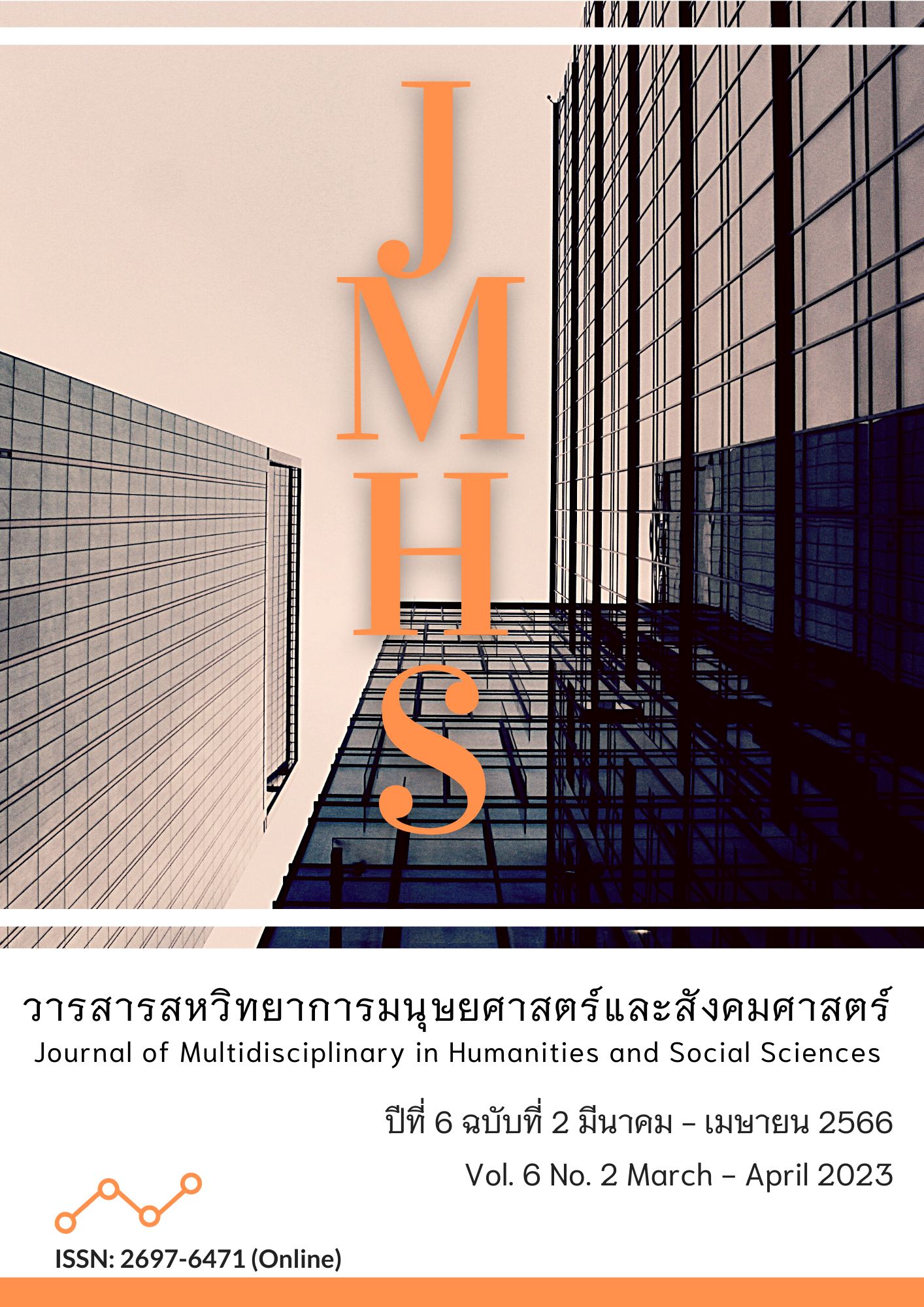Potential Enhancing Lanna’s Food Productive based on Cultural Capital to Career and Income of Sustainability Community
Main Article Content
Abstract
Development based on the potential of community cultural capital is essential for sustainable community economic development. This study focused on the potential for enhancing Lanna’s food productivity based on cultural capital for careers and the income of the sustainability community. Mixed-methods research via participatory rural appraisal for learning and development with the communities in Chiang Rai Province. The collections came from a documentary study, group discussions, learning activities, an in-depth interview, and a questionnaire with key informants such as product entrepreneurs, women's groups, community leaders, community developers, experts, and staffs of 40 persons. Data analysis on qualitative data was analyzed by using grounded theory as open coding, category, axial coding, and theoretical generalizations for interpretation and conclusion; quantitative data was analyzed by using descriptive statistics, including mean, and standard deviation. The results were as follows:
Potential for Lanna’s food production is based on cultural capital such as competence, knowledge, and expertise within the community and an entrepreneurial attitude. Lanna’s food production process of making pineapple flavored khao soi is a souvenir product that creates the value of a career and income. By defining satisfaction as a potential enhancement at high levels, we included product identity, product quality, job creation, and income towards sustainability community. Research knowledge marks Lanna’s food productivity as uniqueness in the career and income of the sustainability community.
Article Details

This work is licensed under a Creative Commons Attribution-NonCommercial-NoDerivatives 4.0 International License.
Views and opinions appearing in the Journal it is the responsibility of the author of the article, and does not constitute the view and responsibility of the editorial team.
References
กันญกานต์ เมืองสนธิ และ ดลฤทัย โกวรรธนะกุล. (2559). การพัฒนาการตลาดของผลิตภัณฑ์ที่จัดจำหน่ายภายในศูนย์การค้าชุมชนในแนวเส้นทางระเบียงเศรษฐกิจตะวันออก–ตะวันตก. วารสารการบริการและการท่องเที่ยวไทย, 9(2), 31- 44.
ฉัตรทิพย์ นาถสุภา. (2558). แนวคิดวัฒนธรรมชุมชน. กรุงเทพฯ: สถาบันพัฒนาองค์กรชุมชน (องค์กรมหาชน).
ชัยประนิน วิสุทธิผล. (2554). คุณค่าของเอเชียเทรนด์ใหม่ที่โลกกำลังเดินตาม. ทำไมต้องเศรษฐกิจสร้างสรรค์. กรุงเทพฯ: ศูนย์สร้างสรรค์และการออกแบบ.
ดวงฤทธิ์ บุนนาค. (2554). New Economy โลกใหม่ เศรษฐกิจใหม่. ทำไมต้องเศรษฐกิจสร้างสรรค์. กรุงเทพฯ: ศูนย์สร้างสรรค์และการออกแบบ.
ทินกฤต สิรีรัตน์. (2564). สมมติว่ามีล้านนา: พื้นที่ อำนาจ-ความรู้และมรดกของอาณานิคมสยาม. วารสารประวัติศาสตร์ธรรมศาสตร์, 8(2), 169-202.
ธีราพร ทวีธรรมเจริญ. (2556). การเรียนรู้วิถีชุมชนจากแนวคิดในทฤษฎีโครงสร้างทางสังคมและทฤษฎีชุมชน. กรุงเทพฯ: คณะสังคมศาสตร์ มหาวิทยาลัยเกษตรศาสตร์.
นิรันดร์ จงวุฒิเวศน์. (2559). การพัฒนาชุมชน. กรุงเทพฯ: รำไทยเพรส.
บำรุง บุญปัญญา. (2548). วัฒนธรรมชุมชนกับการพัฒนาที่ยั่งยืน. กรุงเทพฯ: สถาบันพัฒนาองค์กรชุมชน (องค์กรมหาชน).
มรกต กำแพงเพชร. (2552). ผู้ประกอบการในยุคเศรษฐกิจสร้างสรรค์. เชียงใหม่: มหาวิทยาลัยฟาร์อีสเทอร์น.
รัชฎาพร เกตานนท์. (2560). แนวทางการพัฒนาผลิตภัณฑ์ภูมิปัญญาท้องถิ่นเพื่อส่งเสริมเศรษฐกิจสร้างสรรค์ในจังหวัดนครปฐม. Veridian E-Journal, Silpakorn University, 10(1), 994- 1013.
ศุภชัย เหมือนโพธิ์. (2559). การพัฒนาศักยภาพผู้ประกอบการชุมชน ตามแนวคิดเศรษฐกิจสร้างสรรค์(วิทยานิพนธ์ปรัชญาดุษฎีบัณฑิต). มหาวิทยาลัยศิลปากร.
สุวรรณฤทธิ์ วงศ์ชอุ่ม. (2553). ทุนทางวัฒนธรรมเพื่อการท่องเที่ยวอย่างยั่งยืนของชุมชนท่าคา อำเภออัมพวา จังหวัดสมุทรสงคราม. วารสารวิจัยและพัฒนา, 2(1), 1-2.
สรวงพร กุศลส่ง. (2553). การพัฒนาผลิตภัณฑ์ผ้าทอมุกบ้านติ้วเพื่อส่งเสริมการท่องเที่ยวของชุมชน ตำบลบ้านติ้ว อำเภอหล่มสัก จังหวัดเพชรบูรณ์. พิษณุโลก: มหาวิทยาลัยนเรศวร.
อิทธิพงษ์ ทองศรีเกตุ. (2564). วัฒนธรรมการบริโภคอาหารของชาวล้านนา. วารสารการจัดการและพัฒนาท้องถิ่น มหาวิทยาลัยราชภัฏพิบูลสงคราม, 1(2), 65-76.
Drucker, P.F. (2016). The Effective Executive: The Definitive Guide to Getting the Right Things Done. United States: Harper Business.
McKercher, B., & du Cros, H. (2002). Cultural Tourism: The Partnership between Tourism and Cultural Heritage Management. New York: The Haworth Hospitality.


